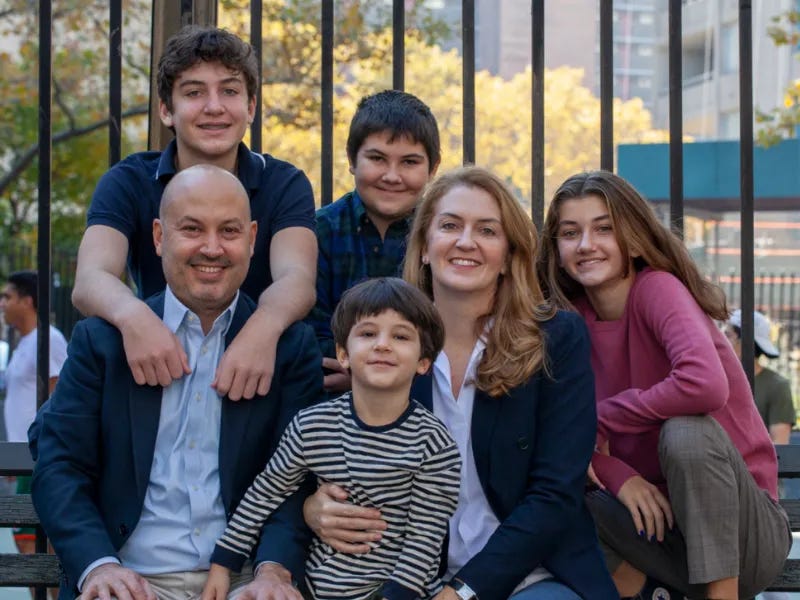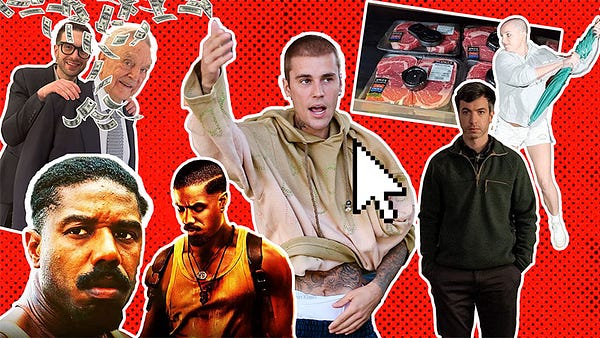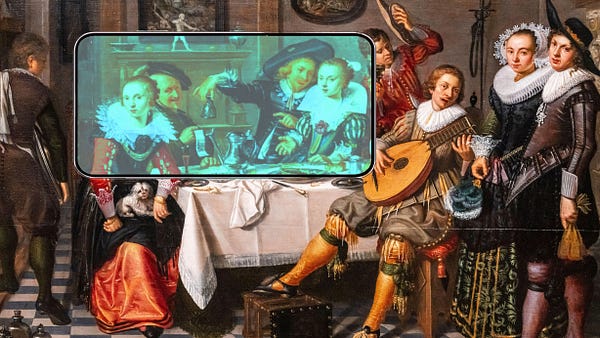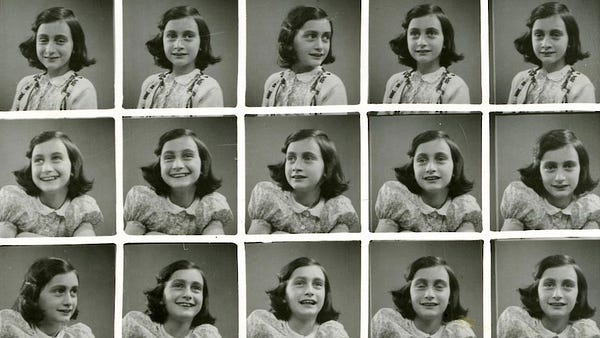
The Free Press

If you google “bleeding heart liberal,” Maud Maron might well turn up as the first hit. Every cause liberals are supposed to fight for, every group they are supposed to champion, every candidate they are supposed to support — well, that was Maron’s not so atypical life and career. Until recently.
A New York City native, Maron lived her early years in subsidized housing when her father walked out on her mother, who was a pediatric nurse at Lenox Hill Hospital. Her mother remarried, the family moved to Pennsylvania, and Maron returned to the city for college. While a student at Barnard, Maron was a clinic escort for Planned Parenthood. Later, she went to Cardozo Law School knowing she wanted to be a public defender. There, she was a student of Kathleen Cleaver, the former Black Panther who was then a visiting professor. (Cleaver calls Maron her “excellent research assistant” on the first page of this published paper about Mumia Abu-Jamal.)
After Maron graduated from Cardozo in 1998, she joined the Legal Aid Society, where she represented the most disadvantaged people in Manhattan. She left in 2006, after the birth of her first child, and then rejoined the nonprofit in 2017, working in the Bronx. “I had always intended to go back. It just took longer than I thought because I wound up having four children over a decade. But when my youngest was 18 months I went back to work,” Maron told me over the weekend. “For me, being a public defender is more than a job. It’s who I am.”
Maron and her husband, an Argentine immigrant, chose to send all of their children to public schools. In 2017 and, again, in 2019 she was elected to the local Community Education Council — the equivalent of a school board. Then, two years ago, she decided to run as a Democrat for City Council in lower Manhattan. Maron had always been politically involved: she was a poll watcher for John Kerry in Pennsylvania during 2004 and contributed many times to Bernie Sanders’s campaign in 2016.
In short, Maron is exactly the kind of lawyer you’d imagine Legal Aid would put on the cover of its brochures. But today the public defender is filing suit in the Southern District of New York against the organization to which she has dedicated her career.
The suit, which you can read here, claims that Maron was “discriminated against on the basis of race” by her employer, Legal Aid Society, and her union, the Association of Legal Aid Attorneys. It claims that both defendants “published knowingly false statements in furtherance of ideological and political motives divorced from the core functions of Ms. Maron’s employment.” In other words: it says she was forced out of her job because of her political views and her race, a violation of Title VII of the Civil Rights Act.
“None of this would have happened if I just said I loved books like White Fragility, and I’m a fan of Bill de Blasio’s proposals for changing New York City public schools, and I planned to vote for Maya Wiley for mayor. The reason they went after me is because I have a different point of view,” she said.
That difference came out most starkly in education, and in Maron’s role on the school board and as a candidate for city council she was outspoken in her views.
“I am very open about what I stand for. I am pro-integration. I am pro-diversity. And also I reject the narrative that white parents are to blame for the failures of our school system. I object to the mayor’s proposal to get rid of specialized admissions tests to schools like Stuyvesant. And I believe that racial essentialism is racist and should not be taught in school,” she told me.
This apparently didn’t sit well with some of her colleagues.
The trouble began in late 2019, when Maron’s boss, Tina Luongo, informed her she was being investigated following a complaint from members of the Black Attorneys of Legal Aid Caucus and Attorneys of Color of Legal Aid. “I knew the accusations were baseless,” Maron said. “It had everything to do with them deeming me an enemy of their politics and trying to go after me at work.”
A former colleague of Maron’s said: “It was McCarthyism. That is the only word to describe it.” Like several others I spoke to, this lawyer requested anonymity out of fear of professional repercussions.
After an investigation that entailed reviewing all her case files and interviewing her direct supervisors, which the lawsuit details, Maron was cleared in January 2020. If she were someone else — a little more politically astute, a little less principled — maybe she would have understood the episode as a warning to shut up. But on July 23, 2020, Maron published an Op-Ed in the New York Post under the headline “Racial obsessions make it impossible for NYC schools to treat parents, kids as people.”
Here’s how it opened:
I am a mom, a public defender, an elected public-school council member and a City Council candidate. But at a city Department of Education anti-bias training, I was instructed to refer to myself as a “white woman” — as if my whole life reduces to my race.
Those who oppose this ideology are shunned and humiliated, even as it does nothing to actually improve our broken schools.
Though facing severe budget cuts, the DOE has spent more than $6 million for the training, which defines qualities such as “worship of the written word,” “individualism” and “objectivity” as “white-supremacy culture.”
That’s when things at work blew up. Three days after she published the piece, the Black Attorneys of Legal Aid Caucus put out a lengthy statement saying that “Maud Maron has no business having a career in public defense, and we’re ashamed that she works for the Legal Aid Society.” It declared: “Maud is racist, and openly so,” and offered no evidence to back up the charge. It said that this veteran public defender was a “prominent opponent of equality” and a “classic example of what 21st century racism looks like.”
The statement said that Maron “is one of many charlatans who took this job not out of a desire to make a difference, but for purposes of self-imaging.” It claimed: “She pretends to favor integration while fighting against it and denying the existence of racism in education.”
The statement also accused Maron of being terrible at her job. “No public defender can legitimately claim to be a proponent of racial justice if they are lax in how they do the work,” it said, adding that “we know for a fact that Maud's commitment to zealous representation of poor people of color is questionable at best.”
One former colleague told me that the accusation of racism in an organization like Legal Aid “is the equivalent of calling someone who works at a Jewish organization anti-Jewish. It becomes impossible to work there.” Never mind that several lawyers who worked alongside Maud told me that the allegations were absurd.
“She was beyond terrific,” said James Chubinsky, Maron’s former supervisor. “When she joined the Bronx Division I didn’t understand why she wasn’t coming as a supervisor, given her resume. She handled the toughest cases and arraignments, she did an enormous amount of work, and she went out of her way to engage the less experienced lawyers in the cases she was handling,” said Chubinsky, who spent the past 41 years at the organization, until he retired a year-and-a-half ago. “Any suggestion that she was anything other than a top-flight lawyer that the Legal Aid Society should be damn proud to have on their staff is a crock.”
Another former co-worker told me: “She was a great colleague. I’ve known her for two decades. She was very caring toward her clients and a very good attorney.” Did they ever see her exhibiting racist behavior or expressing racist views? “Definitely not. Not at all.”
But this lawyer wasn’t willing to defend Maron on the record. Chubinsky said he understands why: “Everybody is scared to death of the r-word,” he told me. “They live in dread that they are insufficiently radical and so they fall in line behind the most radical members of the union. There is a silent majority that keeps their heads down. A couple of lunatics rattle the cage, and the people at the top fall in line,” Chubinsky told me.
That appears to be what happened in Maron’s case. The official, verified Twitter account of the Legal Aid Society, @LegalAidNYC, retweeted the statement from the black lawyers’ group without comment. “The viciousness of the statement and the bizarre decision of Legal Aid to amplify what they knew was false was awful. But the worst part was the silence of all the people who know better, who know that there is absolutely nothing to this,” Maron said.
The organization remained silent while Legal Aid lawyers like Rigodis Appling tweeted statements like this:
And this:
Four of Maron’s colleagues wrote a piece in Gotham Magazine accusing her of “segregation activism” and compared her to the white mobs that opposed the Little Rock Nine. (Appling, and various others I reached out to at Legal Aid, did not respond to requests for comment.)
Maron said it was not easy to find a lawyer to take her case: Challenging activists who claim the mantle of antiracism carries tremendous professional risks these days. “Part of me would have loved to walk away from the whole thing,” she said. “But these ideologues have tried to ruin my name and my career and they are going after other good people. Not enough people stand up and say: It is totally wrong to do this to a person. And this is not going to stop unless people stand up to it.”
“If you had asked me when I became a mom what I thought were the pressing concerns my kids would face I probably would have said climate change, maybe ending the Iraq war,” she said. “I am so shocked that what I worry about now is creeping totalitarianism in America.”
“Defense lawyers are charged with defending citizens accused of a crime. You can do that as a liberal or a conservative and still be an excellent defense lawyer. You can certainly have different views about how to structure admissions to selective schools in New York. The idea that now you have to agree with the leftmost position in your office or be chased out is just wrong.”
This is so obviously true. And yet somehow liberals like Maron have come to be regarded as turncoats in their avowedly liberal institutions.
“It was becoming intolerable,” Chubsinky said of the intolerance that had taken root at Legal Aid. “We talked about all of this behind closed doors. Because you can’t talk about this with the doors open. It’s a really oppressive environment for anyone who isn’t radical, including, by the way, those attorneys of color who don’t share these lunatic views like abolishing the police or saying that it's necessarily racist to arrest people for misdemeanor crimes.”
“So many of us have sat through trainings and listened to equity consultants say things we knew were not true. But it is easier to keep silent and discuss the absurdities in confidence with trusted colleagues and friends than to speak up or object in front of everyone,” said Maron. “The bill for that silence is coming due now.”
“I was embarrassed that I didn’t stand up for her. But I was scared. Everybody is scared of that label,” a former colleague told me.
“Nobody should have to endure what Maud endured,” Chubinsky said. “It’s outrageous.”
If you want to understand why the Maud Maron saga is not just her story but one of the stories of our age, Andrew Sullivan’s most recent column offers a compelling summary of the “radicalization of the American elite against liberalism.” Don’t miss it.
The pilot episode of our podcast, Honestly, speaks directly to this theme. If you haven’t yet, I’d love for you to listen.
Maud Maron and I have never met in person, but we both sit on the advisory board of the Foundation Against Intolerance and Racism. The organization will be supporting her as she pursues her case. You can, too.
Meantime, we need more people like Maud Maron to stand up for common sense. If you have had a similar experience in your workplace, we’re interested in hearing from you. Please write us: tips@honestlypod.com
















Thank you so much for bringing this to us, Bari! It's so heartening to see and hear an old school liberal. I hope that somewhere in the U.S. a new home can be carved out for all of them!
Sophia
I just finished listening to the pod this morning on my way to work. The episode was very moving, and I really appreciate the thoughtful way you approached Maud and allowed her to tell her story. I hope this one gets broad listener-/readership as the subject feels extremely urgent. Something bad is happening in our institutions and corporations and the potential ramifications to individuals who don't agree with the new party line are terrifying. How can we stop it?